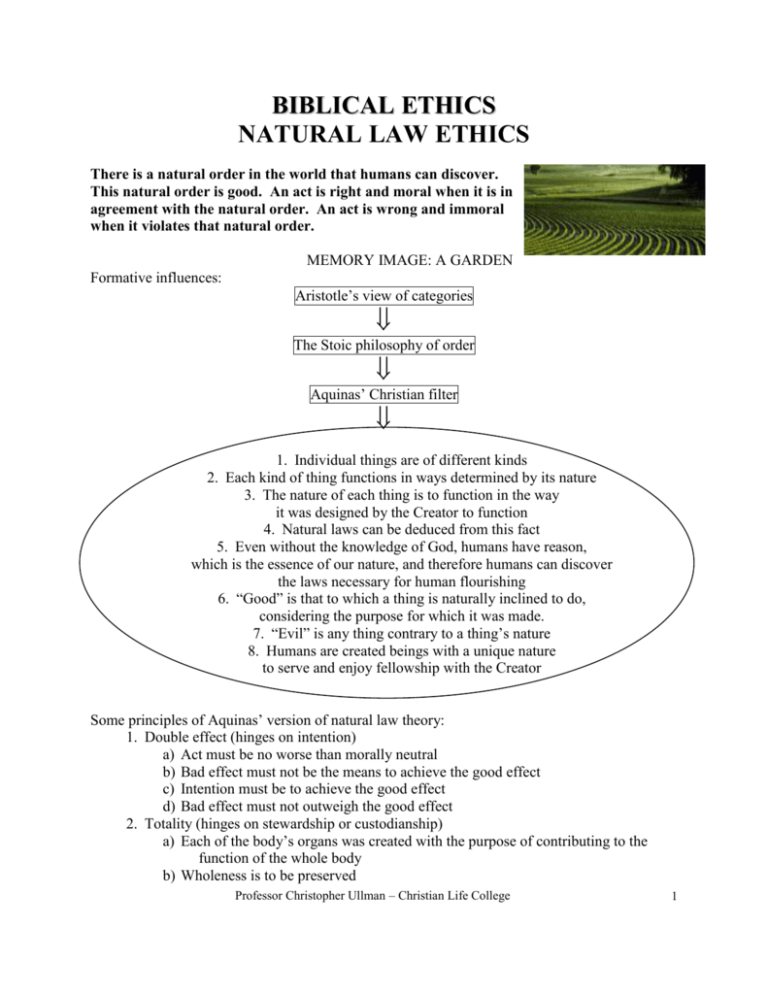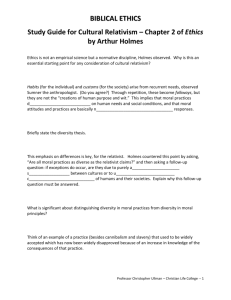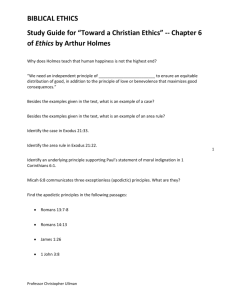QUESTIONS PHILOSOPHERS ASK:
advertisement

BIBLICAL ETHICS NATURAL LAW ETHICS There is a natural order in the world that humans can discover. This natural order is good. An act is right and moral when it is in agreement with the natural order. An act is wrong and immoral when it violates that natural order. MEMORY IMAGE: A GARDEN Formative influences: Aristotle’s view of categories The Stoic philosophy of order Aquinas’ Christian filter 1. Individual things are of different kinds 2. Each kind of thing functions in ways determined by its nature 3. The nature of each thing is to function in the way it was designed by the Creator to function 4. Natural laws can be deduced from this fact 5. Even without the knowledge of God, humans have reason, which is the essence of our nature, and therefore humans can discover the laws necessary for human flourishing 6. “Good” is that to which a thing is naturally inclined to do, considering the purpose for which it was made. 7. “Evil” is any thing contrary to a thing’s nature 8. Humans are created beings with a unique nature to serve and enjoy fellowship with the Creator Some principles of Aquinas’ version of natural law theory: 1. Double effect (hinges on intention) a) Act must be no worse than morally neutral b) Bad effect must not be the means to achieve the good effect c) Intention must be to achieve the good effect d) Bad effect must not outweigh the good effect 2. Totality (hinges on stewardship or custodianship) a) Each of the body’s organs was created with the purpose of contributing to the function of the whole body b) Wholeness is to be preserved Professor Christopher Ullman – Christian Life College 1 BIBLICAL ETHICS c) Actions which threaten wholeness must be necessary to be moral d) Always treat your body as something entrusted to you Objections and responses: 1. “Maybe we weren’t put here for a purpose.” Response: There is plenty of evidence we were. For example, the Second Law of Thermodynamics teaches that every closed system goes from order to randomness, from usefulness to uselessness, from information to confusion. This is confirmed by experimentation, and by everyday experience. Where did the initial high level of organization come from, if not from an Intelligent Designer? The evidence supporting the Anthropic Principle is significant. 2. “‘Function’ and ‘nature’ are imprecise terms.” Response: Empirical observation can clear them up. Faith can aid understanding 3. “What humanity affirms solely on the basis of inherent instincts and philosophical reasoning lacks normative force. Once God’s authority as lawgiver is used to support a particular law or principle offered by a natural law, the question becomes, ‘How then does this differ from divine command ethics?’” Response: There are so many principles for humans that are so essential for ethics. The rational person cannot not know them. For example, to plead ignorance of the principle that one ought not to harm another is absurd, even if the person has no belief in God. By following natural law, cross-cultural accountability is possible, without invoking a particular passage of sacred scripture. Professor Christopher Ullman – Christian Life College 2 BIBLICAL ETHICS DIVINE COMMAND ETHICS SYSTEMS An act is right and moral because God says it is so. An act is wrong or immoral because God says it is so. MEMORY IMAGE: THE BOOK Far and away, this is the most commonly followed system, throughout history. Plato knew of it, and tried to show it was irrational by posing the following dilemma in his dialogue Euthyphro: 1. Is something right because God commands it? 2. Or does God command it because it is right? 1. If you said, "Because God commands it," does that mean that God could command you to lie to your neighbor, and that would make it right? This renders the moral law arbitrary, "right" just because God said so, and perhaps God could change his mind. If you object, "Oh, but he wouldn't! God is moral," you are agreeing with the second position. 2. If you said, "God commands it because it is right," then this means that God is not allpowerful but must limit his choices to that which reason shows is moral. Is God the only one who has reason? Can we not also use our reason to discover what is moral? If so, of what use is the idea of divine command, when it comes to making moral decisions? Plato's crucial assumption: "The Nature of God" and "Moral Standards for Actions" are two separate categories. The Nature of Moral Standards God for Actions Therefore, when God considers whether a given Act X is moral, he must use reason to compare the attributes of Act X to the attributes of Morality: The Nature of Moral Standards God for Actions Act X Professor Christopher Ullman – Christian Life College 3 BIBLICAL ETHICS If this assumption is true, then we have the classic unanswerable dilemma: Which came first, the chicken or the egg? However, Plato, and the many ethicists who have agreed with him, have committed a fatal mistake in logic: The Strawman Fallacy. (This occurs when you distort or exaggerate a person's argument for the purpose of more easily destroying it. It's easier to kill a strawman than a real man.) Do all the world's great religions teach that the nature of God and moral standards of action are actually separate categories? NO. Instead, throughout the literature that comprises the beliefs of the great religions, it is easy to show that the prevailing belief is that morality is one of the key facets of God's nature: The Nature of God Morality & occur simultaneously Action X The question is now, "Which came first, the chicken or the chicken?" Thus, there is no dilemma for the believer, if s/he believes that God cannot violate his own nature, and this is a near universal belief for theists. Q. How can something religious qualify as a system? A.1. By furnishing the basis of moral obligation Theonomy Not Autonomy Not Heteronomy A.2. By referring to a publicly available body of ethical writings containing what are believed to be divine commands that are authoritative and normative. Incomplete list of examples: The Bible (Christianity) The Torah (Judaism) The Koran (Islam) The Granth (Sikhism) The Code of Manu (Hinduism) The Pali Sermons (Buddhism) The Analects (Confucianism) Tao Te Ching (Taoism) How does a divine command system work? 1. Categorize the situation: what kind of ethical decision needs to be made? 2. Search the scriptures, looking for: a) outright specific commands b) general commands c) underlying principles Professor Christopher Ullman – Christian Life College 4 BIBLICAL ETHICS 3. 4. 5. 6. Then, look for a conflicting command or principle. To what does it apply? Resolve the difficulty (if any) rationally Follow the command In doubt or indecision? Consult a religious leader, and/or pray for understanding Objections and responses 1. “The separation of church and state make religious ethical decisions illegitimate, or at best subjective.” The U.S. Constitution's First Amendment does not mandate the elimination of religious beliefs from ethical decision-making. It says, "Congress shall make no law respecting an establishment of religion, or prohibiting the free exercise thereof." It is a simple matter to research the original intent of both Thomas Jefferson, the one who coined the term "wall of separation between church and state," and of the framers of the Constitution, to see that religious beliefs are not only not excluded as a basis for moral and legal justification but that religious beliefs literally saturate their writings, even on the role of government. 1 (They did caution that the federal government should not make a specific denomination the official religion of the United States, however.) 2. “Which religion? They are each so different from one another.” Similarities in ethical standards among the world religions are very apparent. Differences in the basic moralities are very minor. The biggest areas of difference between the world's religions are not ethical, but theological.2 3. Religion is neither rational nor philosophical.” Philosophy was born among highly religious people, and flowered among highly religious cultures. 4. “Does this mean I can’t be ethical if I’m not religious?” No. It means you can be ethical if you are. Divine command ethicists agree that atheists can and often are very moral individuals, but they reason that it is because they have discovered what God says is right without acknowledging that God is the source of morality and of sound moral decisions. 1 For example, the Founders quoted heavily from the Bible, and from authors such as John Locke (who wrote, among other things, A Rational Defense of Christianity) and Charles Montesquieu (who based his three-part government structure of separate judicial, legislative and executive branches on two Biblical verses: Isaiah 33:22 and Jeremiah 17:9). 2 For an enlightening illustration of this amazing agreement throughout history on ethical standards, see the Appendix of C. S. Lewis's The Abolition of Man. Professor Christopher Ullman – Christian Life College 5










